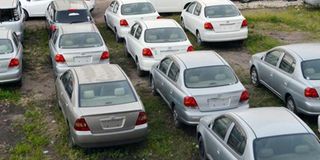New tax pushes cost of car imports up by Sh200,000

Imported vehicles at a yard in Mombasa on June 25, 2015. Buyers of boda bodas and second-hand cars will have to pay more according to new Excise Duty Bill 2015 that was adopted by Parliament. PHOTO | KEVIN ODIT | NATION MEDIA GROUP
What you need to know:
- Prepare to cough up at least Sh300,000 more when the new excise duty rates passed by Parliament on Wednesday come into effect.
- Beer producers will now be taxed Sh100 for every litre they produce while cigarette makers will have to smoke out Sh2,500 for every 1,000 sticks.
- In a commentary in the October 25 edition of the Sunday Nation, Ms Karuku warned that overtaxing beer spells doom on agriculture among other sectors of the economy.
- Car dealers, on the other hand, doubt if the government will achieve its intended target because there is already a decrease in the number of cars being imported.
Are you planning to buy a used car imported from overseas?
Prepare to cough up at least Sh300,000 more when the new excise duty rates passed by Parliament on Wednesday come into effect.
According to car importers who spoke to the Sunday Nation, the excise duty levy of Sh200,000 on all vehicles more than three years old — which is a departure from the current rate of 20 per cent of the car’s price — will hit a majority of Kenyans who want to buy their first vehicle.
For instance, the Toyota Vitz, which the importers said is a hit among Kenyan buyers, will see the dues paid to the government for importing an eight-year-old model, rise from about Sh152,000 to Sh300,000, including 16 per cent value added tax plus the import duty, according to Mr Peter Otieno who chairs the Car Importers Association of Kenya.
The new fees mean buyers will incur an amount that is almost two times what is currently due when importing a Vitz, Mr Otieno explained.
But it is not just buyers of second-hand cars who will feel the pinch.
Consumers of beer and cigarettes have been slapped with new “sin tax” rates after Wednesday’s failure of MPs to overturn provisions of the Excise Duty Bill as outlined in a memorandum from President Uhuru Kenyatta.
Beer producers will now be taxed Sh100 for every litre they produce while cigarette makers will have to smoke out Sh2,500 for every 1,000 sticks.
This will ultimately be transferred to the consumers.
GRAVE CONSEQUENCES
Besides, consumers of fruit and vegetable juices will also have to contend with new price adjustments as those products will attract Sh10 per litre in taxes; same as buyers of new motorcycles who will part with Sh10,000 per unit.
When the rates will finally be implemented, the government hopes to raise an additional Sh25 billion from the items to finance the Sh2.1 trillion 2015-16 budget.
But players in the affected industries are sceptical on whether the government’s gamble on raising more taxes will pay off.
Ms Jane Karuku, managing director at Kenya Breweries, says the government’s penchant for raising taxes on beer every financial year is harmful to the economy.
In a commentary in the October 25 edition of the Sunday Nation, Ms Karuku warned that overtaxing beer spells doom on agriculture among other sectors of the economy.
“Taking huge tax increases on alcohol year on year leads to higher consumer prices that have a negative effect on affordability and demand. This in turn depresses growth across the value chain,” she said.
“The net effect on the economy is therefore negative and the government may not achieve the overall objective of growing revenue collection.”
In a statement, the Responsible Alcohol Drinks Companies Association said there would be far-reaching consequences with the proposed 42 per cent increase in excise tax.
CAR DEALERS DOUBTFUL
Members of the association include Kenya Breweries, Heineken, Pernod Ricard, Ozbecco Brewery, Kings Beverage and Bacardi Martini.
The association’s managing trustee Ken Kariuki said a 500ml bottle of beer that currently costs Sh120 will cost Sh140 when the excise tax is increased from Sh70 to the proposed Sh100 a litre.
“It is a massive hike, especially if you consider some traders will round off to Sh150,” Mr Kariuki said.
Because of such an increase, he warned that investors in the beer industry are likely to keep off Kenya.
“A 42 per cent increase is by any standards massive. As an association and for the avoidance of doubt, we have no problem with modest annual or inflationary excise increments. It is the massive increases that we are against. We understand that the country is undergoing some fiscal pressure but the way to do it is gradually,” Mr Kariuki said.
Car dealers, on the other hand, doubt if the government will achieve its intended target because there is already a decrease in the number of cars being imported.
“Between now and the first quarter of next year, KRA (the Kenya Revenue Authority) will not realise what it wanted because we are cancelling orders,” said Mr Charles Munyori, the secretary of the Kenya Auto Bazaar Association.
Mr Munyori said car importers are operating with a wait-and-see attitude and it has affected importation.
“Most suppliers have called me, asking why there are so many cancellations,” he told the Sunday Nation on Friday.
Mr Otieno, the chair of the car importers’ association, said due to the uncertainties imported vehicles fell from a high of 12,000 to 4,000.





